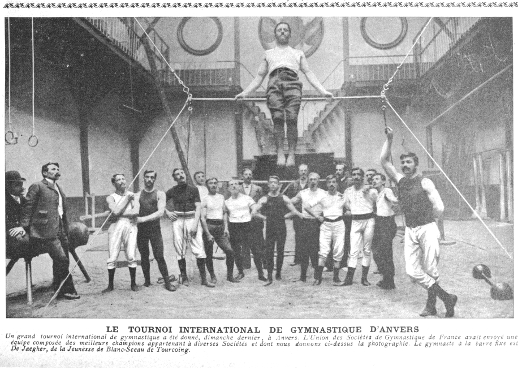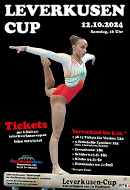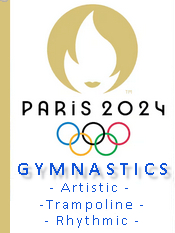WORLD CHAMPIONSHIPS ARTISTIC GYMNASTICS 2023
 |
|
TODAY: Men's qualification, Day 1 |
The 2023 WORLD CHAMPIONSHIPS of ARTISTIC GYMNASTICS will start TODAY at the Sportpaleis in Antwerp, Belgium (30 September to 8 October 2023).
This is the third time Antwerp has hosted the event. Previously, the city hosted the 1st World Gymnastics Championships in 1903 (men only) and most recently, after 110 years, hosted the 47th Worlds Men's Championships and the 36th Women's Worlds in 2013.
Now, in the pre-Olympic year, they have a special and added significance as important qualifying competitions for the Paris 2024 Summer Olympic Games.
♦ All about ►► 52nd MEN's WCh coverages since 1903 (Antwerp),
♦ . and the ►► 43rd WOMEN's WCh since 1934 (Budapest)
* powered by:

.
♦♦ HISTORY: 120 Years of WORLD GYMNASTICS CHAMPIONSHIPS
The year 1903 is considered the birth of the World Gymnastics Championships:
Antwerp, the host city, organised an "International Tournament" from 14 to 18 August, initiated by the Frenchman Charles Cazalet, President of the "European Gymnastics Federation", and Nicholas J. Cupérus (BEL) and Karel Muller (NED), in which men's teams from four countries took part: Belgium, France, Luxembourg and the Netherlands. (A team from Italy had also arrived, but after seeing the absolute superiority of the French, the Italians preferred to watch the competition only as spectators).

* The French Men's Team in Antwerp 1903 ( ► Click for big)
(Photo of the weekly magazine "Vie au grand" from 1903,August 21
.
♦♦ Nations Balances
It was not until the 10th tournament, in Budapest in 1934, that it was officially renamed "WORLD CHAMPIONSHIPS", as Mexico, for example, was the first non-European delegation to take part. In the gymnastics chronology, the past 9 events were also retroactively given World Championship status, as the "European Gymnastics Federation" as the umbrella organisation had changed its name to "International Gymnastics Federation" in 1921. In 1934, women's competitions were held for the first time.
♦ Men's gymnastics in the first half of the century was dominated by France, then the Czech Republic and Switzerland.
 With the entry of the Soviet Union in 1954 (8 team gold medals) and from then on in constant competition with Japan (5 gold medals), one generally speaks of the beginning of the era of modern international artistic gymnastics, which subsequently led to rapid developmental thrusts in other nations as well. This was also the case for the German gymnasts, especially due to consistent sports promotion in the GDR. Whereas Germany's gymnasts had only won one team bronze medal in 1934, the GDR gymnasts added six more team bronze medals between 1966 and 1987 and crowned this historic record in 1989 in Stuttgart with the silver medal behind the USSR and ahead of China.
With the entry of the Soviet Union in 1954 (8 team gold medals) and from then on in constant competition with Japan (5 gold medals), one generally speaks of the beginning of the era of modern international artistic gymnastics, which subsequently led to rapid developmental thrusts in other nations as well. This was also the case for the German gymnasts, especially due to consistent sports promotion in the GDR. Whereas Germany's gymnasts had only won one team bronze medal in 1934, the GDR gymnasts added six more team bronze medals between 1966 and 1987 and crowned this historic record in 1989 in Stuttgart with the silver medal behind the USSR and ahead of China.
With the processes of social political change, China's team victories followed 12 times from 1994 onwards, in renewed competition with the resurgent Japanese and interrupted only three times by Russian team victories. The two bronze medals of the united gymnastics Germany (2007 in Stuttgart and 2010 in Rotterdam) and their main protagonists, such as Eugen Spiridonov, Philipp Boy, Marcel Nguyen and Fabian Hambuechen, are also fondly remembered ...!
* At the moment, the German gymnasts' current fight is probably rather and predominantly for a successful Olympic qualification (top 12), which was by no means made easier by the injury misfortune at the World Championships venue two days before the start of the competition by German veteran Andreas Toba! In his place, Nick Klessing from Halle has now joined the team, which now wants to fully concentrate on the team result on the first day of the competition with a high fighting morale!
►► WCh MEN's TEAM BALANCES
♦ International women's gymnastics was also determined by the dominance of the  Soviet women from the beginning of the 1950s: From 1954 onwards, they won team gold eight times. In the beginning, the Czechoslovak Republic held its own during the times of the incomparable Vera Caslavskaja, then Romania became the strongest competitor in the seventies with the legend Nadja Comaneci and drew even until 2001 with 8 team gold medals, followed by 2003, when the gold Era of the USA girls continued until today with 8 team gold medals and now as defending champions. Most recently, they have been mainly besieged by their Russian rivals, who have only managed to win once so far (2010).
Soviet women from the beginning of the 1950s: From 1954 onwards, they won team gold eight times. In the beginning, the Czechoslovak Republic held its own during the times of the incomparable Vera Caslavskaja, then Romania became the strongest competitor in the seventies with the legend Nadja Comaneci and drew even until 2001 with 8 team gold medals, followed by 2003, when the gold Era of the USA girls continued until today with 8 team gold medals and now as defending champions. Most recently, they have been mainly besieged by their Russian rivals, who have only managed to win once so far (2010).
German team medal successes in women's gymnastics are exclusively limited to the past GDR era, starting in 1967 with 2 silver medals and then 6 bronze medals in a row, supported at that time by the outstanding world stars of the two vice world champions Erika Zuchold and Maxi Gnauck, the two all-around bronze medallists Angelika Hellmann and Dagmar Kersten and, of course, the "gymnast of the century" Karin Janz.
In the political post-reunification period, three team rankings among the best eight were on the record of success.
* But at the moment, the German Antwerp squad's fingers are crossed, just like the men's squad, for reaching the "Olympic Family", i.e. for making it into the top twelve of an Olympic qualification that is as successful as possible, because they will be travelling without their injured gymnasts Elisabeth Seitz and Emma Malewski.
►► WCh WOMEN's TEAM BALANCES
.
→ Daily 2023 MEN's WCh Coverages - or
→ Daily WOMEN's WCh Coverages
.
* powered by:

* The German SPORTMANUFAKTUR B ä n f e r is partner
of modern competitive gymnastics & artistic gymnastics of all disciplines.
.
►►  German speaking 2023 WCh Worlds Coverages
German speaking 2023 WCh Worlds Coverages
.





























